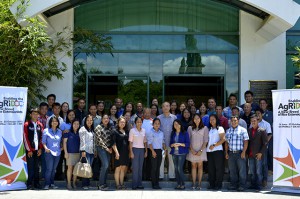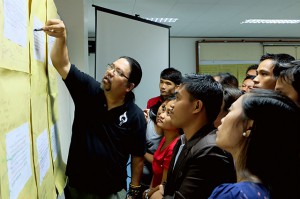Continuing its objective of enabling the next generation of rice extensionists, Project IPaD welcomed participants from Visayas and Mindanao to its second batch of training program titled “Enabling the AgRiDOC: a new breed of rice extensionists.” 
The Improving Technology Promotion and Delivery through Capability Enhancement of the Next Generation of Rice Extension Professionals and Intermediaries or IPaD is one of the seven projects under the flagship of the DA’s Food Staples Sufficiency Program. Being funded by the National Rice Program through the DA-Bureau of Agricultural Research, it is the only project that deals directly with improving the agricultural extension system in the Philippines.
A new training program designed for rice extensionists is one of the ways by which Project IPaD is helping revitalize the Philippine agricultural extension system. The program’s foundation is now farm community transformation, not just technology transmission.
During the opening program, Mr. Julian Lapitan, interim head of IRRI partnerships office and lead of Project IPaD at IRRI said to the trainees: “As extension workers, your work should not only be limited to transmission, but it should go toward transformation. And you cannot transform if you yourself are not transformed.”
Director Edmund J. Sana of the National Rice Program challenged the future AgRiDOCs (Agricultural Development Officers of the Community) to maximize the opportunity to learn from the training.
“You are here to get more, to increase your capacity, and be motivated to enjoy your work so that you can deliver,” he said.
Director Sana was instrumental in the realization of the Project IPaD.
“The moment you give justice to your job, that’s when you start to enjoy it; and it will not be a work anymore if you enjoy it,” he told the participants.
“You (extension workers) have to put it in your hearts to serve our farmers, our community, and our country,” said Emelita Flores, municipal agriculturist of Sto. Domingo, Nueva Ecija. Flores is a three-time Rice Achiever awardee for outstanding performance in extension. The training has a diverse pool of 25 participants. They are young, age range is 22-41 years old, agricultural technicians, extension workers, college instructors, staff members of the Agricultural Training Institute (ATI), and staff members of PhilRice branch stations. 
The trainees will undergo 4 months of intensive training that aims to strengthen their technical competence, nurture values relevant to development work, and sharpen their leadership, communication, and entrepreneurial skills.
Guiding the program is the curriculum, which was piloted last season with the Luzon batch. The curriculum is a strong mix of engaging and experiential learning designed to heighten trainees’ understanding and appreciation of rice-based farming system and the development processes in farming communities.
The training curriculum consists of six modules: BeTransformed, AgRiCool, AgRiSurvivors, PalaYcheck and PalaYamanan v2.0, Rise with Rice, and Be RICEponsible. “I expect to learn many things about rice production and agriculture in general from this training, so I can better assist our farmers,” said Jun Rey Samillano, AgRiDOC trainee from ATI-RTC Region 12.
The training runs from 16 June to– 23 October, 2015. Upon graduation, the AgRiDOCs are expected to help raise the bar of performance in extension in the Philippines, increase productivity to secure food self-sufficiency, and help catalyze farm community transformation.
Plans for outscaling the project beyond 2015 are being laid out.




